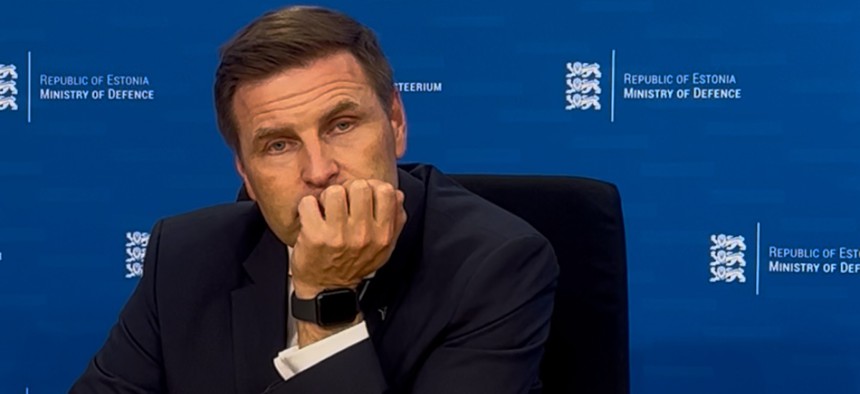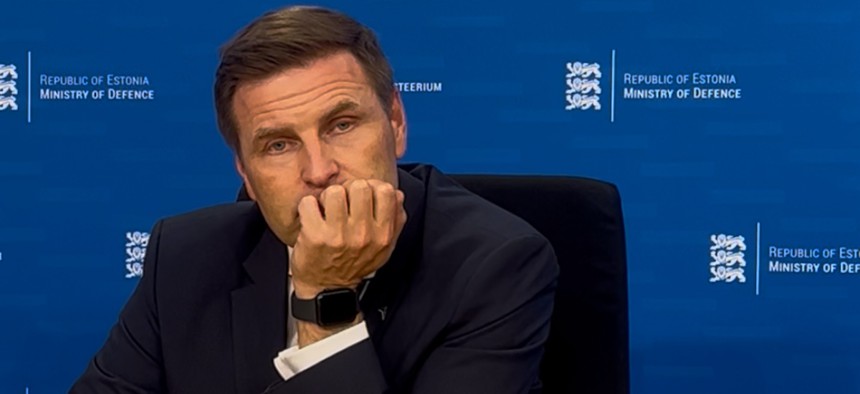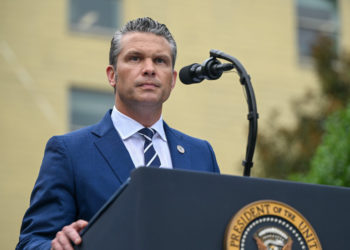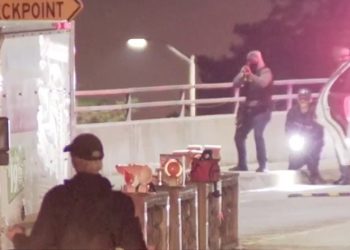
TALLINN, Estonia—NATO will issue a joint declaration soon on continuing Russian air incursions, Estonian Defense Minister Hanno Pevkur said Monday, and Estonia hopes it will include expanded air patrols and other defense measures under the recently announced Eastern Sentry coordinated air defense campaign.
Estonia requested an Article 4 consultation among NATO allies on Friday following an incursion that Pevkur said was “totally different” from three drone incidents Estonia experienced earlier this year, because it involved three MiG-31 fighters and represented a dramatic and dangerous escalation.
NATO jets escorted the Russians out of Estonia’s airspace, but Pevkur emphasized that Estonia, backed by the alliance, was prepared to shoot down Russian planes over its territory if necessary. “If there is a need, we do not hesitate, and this is the common understanding and the outcome of the [Article 4] consultations.”
A statement from the Estonian Foreign Ministry on Monday, coinciding with a special U.N. General Assembly session on Russia’s behavior, said the Russian jets remained in NATO skies for 12 minutes, flying deep into Estonian airspace and covering nearly 100 kilometers inside Estonian sovereign territory, “moments away from Tallinn, a NATO and EU capital.” The incident marked the fourth Russian invasion of Estonian airspace this year, according to the statement.
Pevkur on Monday elaborated on the decision to escort the jets out of Estonian airspace rather than shoot them down: “We saw that [the Russians] were flying not towards our capital, but still towards Tallinn.” They decided against shooting at the aircraft after they “analyzed what kind of weapon systems they had,” he said.
The incident over Estonia occurred about a week after Polish forces downed several Russian drones that had invaded that country’s territory earlier this month. (A Russian drone encroached on Romanian airspace in a separate event.)
Alarmed by the continued airspace violations, leaders of allied states have also escalated their rhetoric. Czech President Petr Pavel on Saturday said the allied response to such events must include a “military response. Russia will very quickly realize that it has made a mistake and has crossed acceptable boundaries.”
Speaking before the U.N. General Assembly on Monday, Polish Deputy Prime Minister Radosław Sikorski echoed the warning: “To the Russian government: If another missile or aircraft finds itself without permission in our airspace, deliberately or by accident, and its wreckage falls on NATO territory, please don’t come here later to complain. We warned you.”
Estonia is confident that the alliance’s announcement will include further enhancements to the Eastern Sentry mission to more directly address the growing threat of manned fighters and bombers, not just drones. “Different capabilities inside the Eastern Sentry will be increased. But definitely this process is at the moment in the planning phase,” Pevkur said. “The point is that [Europe’s] eastern flank has to have better capabilities for detection and for interception.”
NATO officials on Monday declined to be specific on what the consultation meeting will yield in terms of additional jets or air defense systems. U.S. Army Col. Martin O’Donnell, spokesman for NATO’s Supreme Headquarters Allied Powers Europe, told Defense One, “It would be inappropriate to speculate on the outcome” of the Article 4 discussions before the talks have occurred, and said a NATO update will come after.
“As far as Eastern Sentry goes, it already takes an expansive approach, one that has shown it can defend NATO. In terms of the deployment of any additional assets, that would be for nations to announce,” he said.
The post NATO will ‘not hesitate’ to act if Russian threats continue, says Estonian defense minister appeared first on Defense One.




